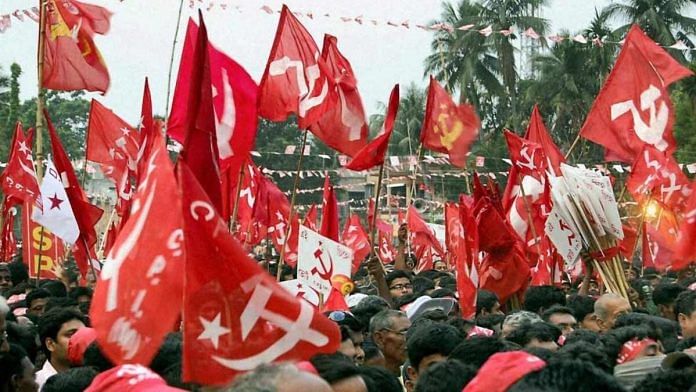


According to the Oxford English Dictionary, the word “turncoatism” has been in use since 1830. But the phenomenon of politicians changing party affiliations is relatively recent in Kerala.
True, it may have been prevalent in other states over the years, but in “God’s Own Country,” where the Communist Party was democratically elected to power after the state’s formation in 1957, ideological exclusivity has always been held in high regard.
In the run-up to last month’s fiercely contested by-election in Palakkad, the Communist Party of India (Marxist) drew first blood by persuading Congress digital media convener P Sarin to switch sides and contest on its ticket.
If that wasn’t unsettling enough, Congress brought Sandeep Varier over from the Bharatiya Janata Party (BJP) on the eve of the polls. Now, the BJP itself has poached two mid-level CPI(M) leaders—Bipin C Babu and Madhu Mullasseri—much to the Marxist party’s shock.
Also read: How Left is trying to breach IUML-Congress’s Muslim support base in Malabar
Not long ago, the CPI(M) would go to town if a dissident Congress leader crossed over to the BJP, making it a propaganda tool and appealing fervently to the Muslim community on that basis.
“Today’s Congress is tomorrow’s BJP,” their banners and posters would announce, while they made a virtue out of their own cadres desisting the lures of the BJP. Of course, the same Marxists conveniently ignored fellow comrades defecting in West Bengal and Tripura.
The comrades would brag about the party cadres receiving political education from a young age, which ostensibly produced staunch communists straight out of schools and colleges.
In fact, there was a time when a defection from the CPI(M) to the BJP—or vice versa—was virtually unheard of. In Kannur and the rest of Malabar, such an act would be treated as akin to apostasy, followed by social ostracism.
Also read: There’s no questioning ‘Captain’ Vijayan in Kerala—not even his oversized role in LDF’s defeat
The growing ideological flexibility among politicians—and even cadres—in recent times can be traced to the CPI(M)’s gradual weakening in Kerala.
Sure, the party continues to be in power through Pinarayi Vijayan’s cult of personality. Yet, it is anyone’s guess what would remain of the party if it were to lose power after consecutive terms. Unlike West Bengal, where the CPI(M) ruled unabated for 34 years, alternating governance in Kerala kept the party honest and disciplined. There was no evident degeneration, and even the power tussles of the early 2000s between VS Achuthanandan and Vijayan were framed as ideological clashes.
The Marxist puritans would rally behind Achuthanandan, writing poems and articles exhorting the need to preserve the old order, while Vijayan’s cohorts argued for adapting to the post-liberalisation era. However, with the gradual sidelining of Achuthanandan and Vijayan towering over the party, ideological pretensions were slowly watered down to accommodate all kinds of compromises.
Unlike what EMS Namboodiripad once qualified as “right-wing deviancy”, neo-liberal practices would be adopted wholesale, albeit couched in Leftist jargon, making a mockery of Marxist-Leninist principles or whatever was left of it in social-democratic terms. Marxist poets and cultural figures, who switched completely over to Vijayan’s side after Achuthanandan wilted away, too had no trouble hailing the ‘course correction’ under changed circumstances. The Left writers who did not switch allegiance would lose their relevance as awards and prizes were reserved only for those fleet-footed ones who switched camps deftly.
Also read: How Kerala’s Left hopes to benefit from polarisation of Christians and Muslims
The economic shapeshifting wasn’t as dramatic as what was to follow—the social and political ramifications of the Left’s political opportunism.
At some point—precisely, the Palakkad Plenum in November 2013—the CPI(M) initiated a ‘course-correction’ of sorts. It decided to keep an eye on the deviancy of cadres and barred them from attending temple rituals. Unsurprisingly, it only gave a fillip to the reactionaries.
It would take another decade for the party to wake up to the consequences of such diktats. But by then, as the 2024 Lok Sabha election results showed, it would be abundantly clear that a sizeable chunk of the CPI(M)’s Hindu vote bank had shifted to the BJP.
It also did not help that the CPI (M) would cynically opt to tap into the prevailing sentiment, stoke it ever so gently, and reap the rewards in elections over the years.
For instance, why did the undivided Communist Party tap into the latent Hindu sentiment echoed by the likes of Nair Service Society (NSS)’s Mannathu Padmanabhan in 1957? Why was a Muslim-majority district (Malappuram) carved out of the minority-dominated regions of Palakkad and Kozhikode during the second term of EMS from 1967? Wasn’t the so-called Tathwadhishtitha Rashtreeyam (principle-based politics) championed by EMS in 1987 a euphemism for ‘soft-Hindutva’? How did Saddam Hussein ever become a campaign issue in Kerala in the 1991 district council election or thereafter?
Most recently, why was the Palestine issue made central to the CPI(M)’s Lok Sabha campaign in 2024? On cue, a section of CPI(M) leaders concluded that a major reason behind the Left Democratic Front (LDF)’s rout in 2024 was ‘minority appeasement’ (read, making Hamas synonymous with Palestine during an election to Parliament in Kerala).
The CPI(M) also saw merit in running with the hares and hunting with the hounds. For instance, in the 2021 Kerala assembly election, the party tapped into the latent Islamophobia spreading across Central Travancore even as it made an issue of the Citizenship Amendment Act (CAA) in Malabar.
Alas, such opportunism was going to be busted at some point, and people saw right through it.
Also read: Hamas is synonymous with Palestine in Kerala. CPI(M), IUML have boxed Congress into a corner
Arun Shourie famously described the BJP as “Congress with a cow.” Shorn of its ideological trappings and a burgeoning gap between policy and practice, today’s CPI(M) may not seem much different from the BJP, at least to younger cadres.
The Left’s cynical politics, which drew a lot of dividends over the years, is finally coming back to haunt them.
It is a fallacy to believe that Keralites are cut from some different cloth, that there is no scope for sectarian thought. Of course, people in Kerala are still wary of being communal in public, but it is naïve to assume that stoking such passions will not impact society at large.
Finally, there is the emergence of career politicians, who prioritise parliamentary positions over social service. For them, politics is just another career, nothing more. In such an environment, ‘turncoatism’ is likely here to stay.
For the CPI(M), this should be an occasion for introspection. Is the party’s ideological similitude under the camouflage of Leftism making it indistinguishable from the right-wing in Kerala, where people can easily switch parties and rationalise it?
Anand Kochukudy is a Kerala-based journalist and columnist. He tweets @AnandKochukudy. Views are personal.
(Edited by Prashant)






